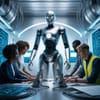The world is witnessing a significant transformation with the emergence of AI-powered robots. These robots are not only enhancing efficiency and productivity but also driving innovation across various industries. With advancements in machine learning and computer vision, robots can now perform complex tasks that require adaptability and decision-making.
The impact of AI-powered robots on the job market is expected to be substantial. While some roles may become obsolete due to automation, new jobs will emerge that require human skills like empathy, creativity, and problem-solving. To thrive in this changing landscape, workers will need to adapt to new technologies and acquire skills that complement AI-powered robots.
Industries such as manufacturing, healthcare, and logistics will be significantly impacted by the integration of AI-powered robots. In manufacturing, robots will enhance production efficiency and quality control. In healthcare, robots will assist in surgeries, patient care, and rehabilitation. In logistics, autonomous robots will improve delivery and supply chain management.
As the job market evolves, it's essential to invest in education and retraining programs that prepare workers for the changing landscape. The future of work will require a workforce that is adaptable, tech-savvy, and creative. By embracing the potential of AI-powered robots, we can unlock new opportunities for growth, innovation, and progress.


